Healthy Athletes in the Kitchen
eating for sports performance
A Healthy Athlete’s Guide to Nutrition

What an athlete eats and drinks has a major impact on their health, sports performance, and recovery across all levels of training and competition. Athletes typically have higher energy needs as well as require more carbohydrate and protein in their diet, and timing of meals and snacks is a consideration in performance and recovery. Understanding the fundamentals of sports nutrition and developing an eating plan should be an extension of every athlete’s training plan.
Fundamentals of Sports Nutrition

Athletes who train and compete in sports place an increased energy demand on their muscle, cardiovascular, and respiratory systems. Depending on the duration and intensity of training or competition, energy needs can be up to twenty times higher than sedentary peers. Failure to consume adequate energy results not only in fatigue and poor performance but often leads to injury or burnout. All foods are comprised of a combination of carbohydrate, protein, and/or fat, the macronutrients that provide energy for our bodies. Let’s look at how each of these energy sources support sports performance.
Carbohydrates
The primary source of energy for all athletes is carbohydrate. Carbohydrates are stored as glucose in the blood and as glycogen in the liver and muscle. With exercise, the body burns through glucose first, and then pulls from glycogen to provide energy. The goal of proper nutrition is to provide enough carbohydrate to replenish glucose and glycogen stores between training sessions or competitions to allow for maximum energy availability for the next training session or event. Athletes should aim for 45-75% of their calories to come from quality carbohydrates. Whole grains, starchy vegetables, and fruits are nutrient-dense carbohydrate choices that will provide long-lasting energy. Other vegetables (such as broccoli, cauliflower, carrots, green beans, leafy greens, etc.) also provide carbohydrate but are less energy dense than other sources of carbohydrate and should be included to support regular intake of a wider variety of vitamins and minerals.
SOURCES OF CARBOHYDRATES
| Whole Grains | Starchy Vegetables | Fruit |
| Oatmeal | Sweet potatoes | Apples |
| Brown rice | White potatoes | Bananas |
| Quinoa | Winter squash | Oranges |
| Wheat berries | Corn | Grapes |
| Barley | Peas | Peaches |
| Whole grain bread | Beans | Pears |
| Whole wheat pasta | Legumes | Berries |
| Whole grain cereal | Beets | Melons |
| Popcorn | Dried fruits |
Protein
Protein does not provide a significant amount of energy during exercise, but it is an important nutrient for strength and recovery. The key role of protein is to repair muscle tissue that is broken down during exercise and to build new muscle to adapt to the stress of the sport. Protein also plays a role in maintaining the immune system. The body needs about 20g of protein at a time to stimulate muscle growth and repair, but the body can only utilize about 40g of protein at one meal for muscle building and repair. Any additional will be stored as fat or used for energy. Therefore, athletes should aim to eat about 20-40g of protein at each meal, or about 4-6 ounces of most proteins. Depending on an athlete’s overall energy needs, protein intake may range from 15-30% of energy needs. Athletes with higher protein needs should add protein containing snacks between meals.
Protein is made up of building blocks called amino acids. There are twenty amino acids, of which nine are considered essential because the only way to get them is through food. Essential amino acids are necessary for muscle building and recovery. Most animal-based proteins and some plant-based proteins have all nine essential amino acids. All athletes can use both plant and animal proteins to meet their needs — it all adds up! Vegetarian or vegan athletes should take care to include a variety of plant-based proteins to ensure they consume all essential amino acids.
SOURCES OF PROTEIN
| Source | Serving Size | Protein (g) |
| fish, skinless poultry, lean beef, and pork | 4 ounces | 28 |
| milk and yogurt | 8 fluid ounces | 8-28 |
| egg | 1 each | 6 |
| plant-based milk, yogurt | 8 fluid ounces | 5-10 |
| nuts and seeds | 1 ounces | 6-8 |
| nut butters | 2 tablespoons | 8 |
| tofu, tempeh, seitan | 4 ounces | 20-25 |
| beans and legumes | 1 cup | 14-18 |
| whole grains | 1/2 cup | 2-4 |
Healthy Fat
Like protein, fat is not a primary source of energy during most exercise, but endurance athletes exercising at a lower intensity and for a long duration may utilize more fat as a mechanism to reserve glycogen (carbohydrate) for energy. Aside from this small amount used for energy, athletes should consume healthy fats, from unsaturated sources, to help with absorption of fat-soluble vitamins and minerals, including vitamins A, D, E, K, and minerals like calcium. Fats are also energy dense, making them an important source of calories for athletes with higher energy needs. Athletes should focus on meeting their carbohydrate and protein needs, then use unsaturated fats to meet their remaining energy needs. Unsaturated fats include monounsaturated, polyunsaturated, and omega-3 fats. For most athletes, these healthy unsaturated fats should provide 20-35% of energy needs. Saturated fats should make up less than 10% of daily energy and trans fats should be avoided.
SOURCES OF DIETARY FAT
| Type of Fat | Source |
| monounsaturated | olive, canola, safflower, sesame oils, avocado, almonds, peanut butter, pumpkin seeds |
| polyunsaturated | soybean, corn, sunflower oils, sunflower seeds |
| Omega-3 | flax seeds, walnuts, salmon, mackerel, tuna |
| saturated | butter, cheese, cream, poultry (mainly in skin), beef, pork, lamb, coconut oil, palm oil |
| trans | partially hydrogenated oil, fried foods, processed snack foods, packaged baked goods, margarine |
Vitamins and Minerals
Beyond macronutrients, athletes also have a greater need for specific vitamins and minerals, known as micronutrients. Micronutrients play a vital role in turning food into energy, repairing muscles from positive stress caused by exercise, delivering oxygen to working muscles, building bones, and promoting immunity to prevent illness. Specific nutrients of importance are calcium, vitamin D, iron, and sodium.
Calcium
Stress fractures are one of the most common sports injuries that prevent athletes from training or competing, especially in high-impact sports that include running, jumping, or physical contact with other players. Calcium and Vitamin D work together to build bones and prevent fractures. In addition, Vitamin D has been shown to promote immune function. Athletes should aim to include high-calcium foods like milk, yogurt, and leafy green vegetables at each meal. Vitamin D is found in salmon, tuna, egg yolks, and fortified dairy and plant-based products. When choosing plant-based dairy products, check the label to make sure they are fortified with calcium too.
Iron
Iron helps transport oxygen to working muscles through red blood cells. Without enough iron, muscles fail to get enough oxygen causing early fatigue. Iron is especially important for female athletes due to losses with menstruation. Eating lean red meat, dark meat poultry, beans, raisins, and spinach several times a week can assist in meeting iron needs. For plant-based iron sources, including foods high in vitamin C, like citrus fruits or tomato, improves iron absorption.
Sodium
Sodium is an electrolyte that plays a critical role in fluid balance. Although many people consume too much sodium, athletes lose sodium in sweat, which impacts hydration and performance. Athletes who are heavy sweaters, have “salty sweat,” or participate in exercise lasting greater than two hours may have an even greater need for high-sodium foods. Condiments like soy sauce, pickles, and table salt can help add sodium to meals.
Building an Athlete's Plate
The Athlete’s Plate is a collaboration between University of Colorado Sports Nutrition Graduate Program and the United States Olympic Committee. It is used as a visual tool for athletes to adjust their nutrition according to their training and competition loads. The Athlete’s Plate provides sample plates for easy, moderate, and hard training days. As training intensity increases or in preparation for a competition, an athlete’s plate should include more carbohydrate foods to maximize glucose and glycogen stores. It is important to note that individual nutrition needs vary from person to person and by specific sport, time in the season, and personal goals. For individualized nutrition recommendations, speak to a registered dietitian.
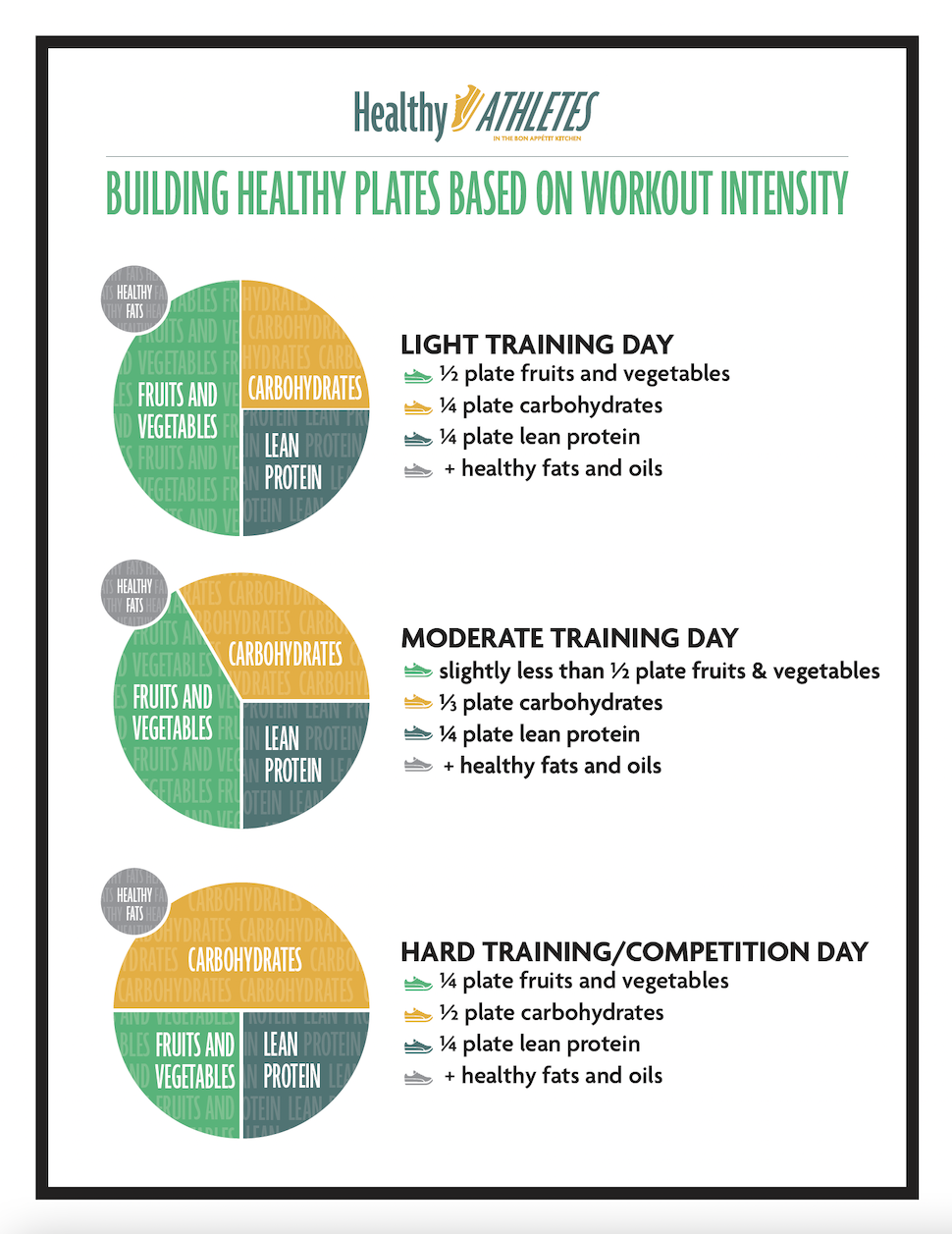
Nutrient Timing
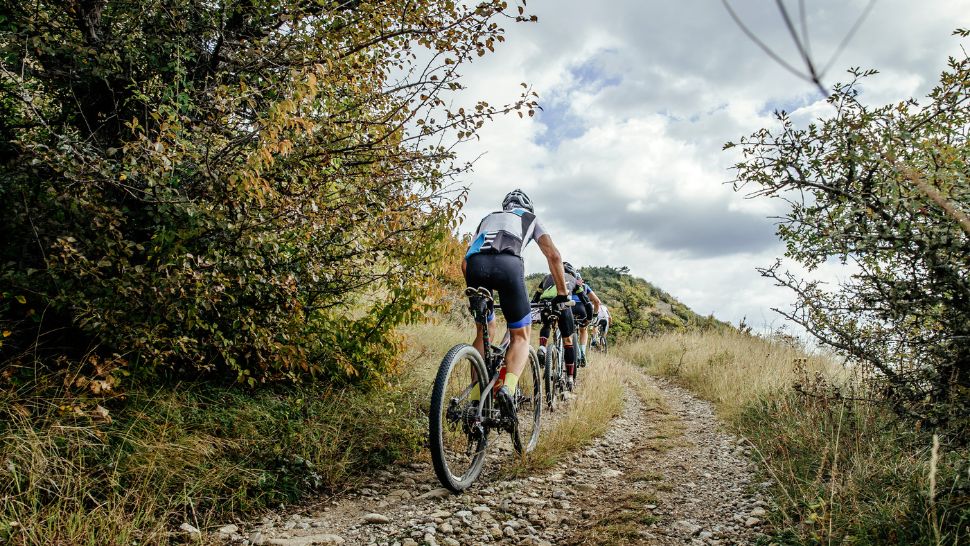
Athletes need to be aware of not only what they eat, but also when they eat. Give special consideration to pre-event meals, fueling during a training session or competition, and post-event nutrition. Optimizing food choices for each of these times can improve sports performance and help an athlete recover faster.
Pre-event Meals
High carbohydrate meals and snacks will “top off” glucose and glycogen stores needed to sustain exercise. Athletes should aim to consume a meal 3-4 hours before training or competition. Meals should be high in carbohydrates, moderate in protein, and low in fat and fiber. Approximately 30 minutes before a workout, athletes should consume a small snack that is high carbohydrate and little to no protein, fat, and fiber. This time immediately prior to physical activity is when athletes should choose more simple-to-digest carbohydrate foods vs. whole grains.
- Pre-event meal: turkey and Swiss on wheat bread with lettuce, tomato, and mustard; apple
- Pre-event snack: banana or fruit smoothie, bagel with jam, cereal with milk, granola bar
During Event
When training or competition is longer than an hour, aim to consume 30-60g of carbohydrate every hour. Sports drinks, dried fruit, crackers, or granola bars are good choices. Shorter duration or less intense training does not require additional fuel or electrolytes. Athletes should aim to consume 6-12 ounces of fluids every 15-30 minutes of activity.
Post-Event Nutrition
Eating after an event replenishes glucose and glycogen and repairs muscle damage caused by exercise. As soon as possible, eat a snack or meal with a 3:1 mix of carbohydrates and protein. A good goal for a post-event meal is 60g of carbohydrates and 20g of protein.
- Post-event meal: grilled chicken breast, pasta with marinara sauce, broccoli or salad, and fruit
- Post-event snack: Greek yogurt parfait or chocolate milk
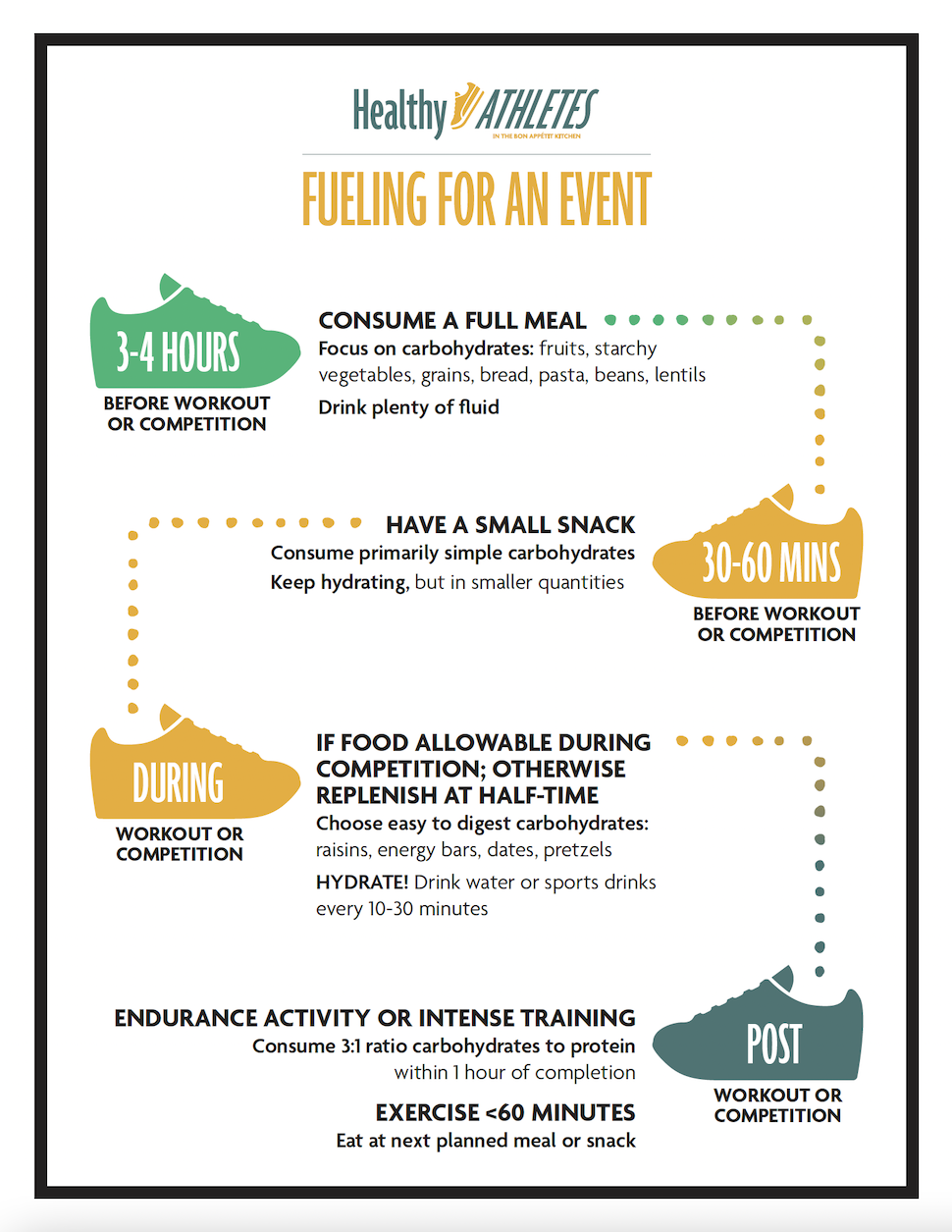
Hydration
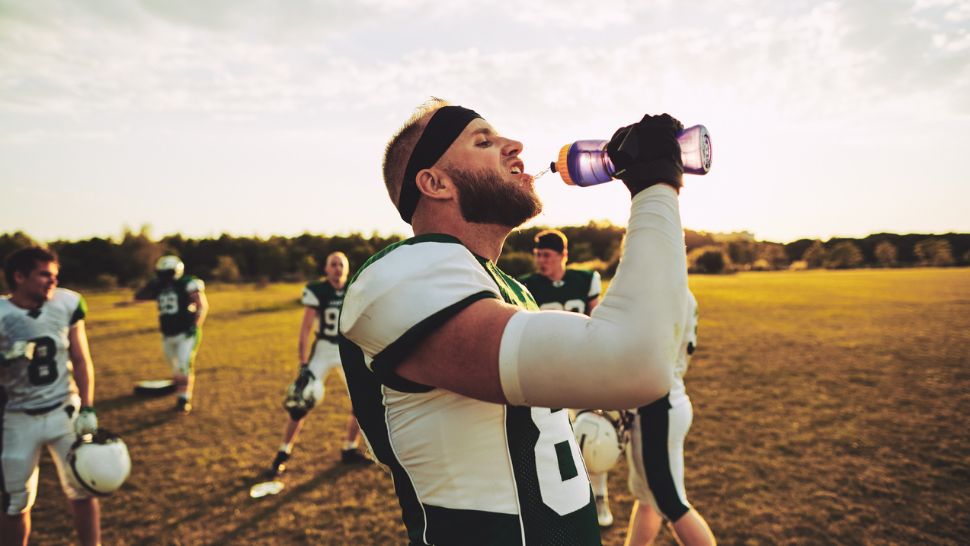
Adequate hydration is vital to an athlete’s performance and health. Dehydration that causes a 1-2% loss of body weight can result in fatigue and impaired performance. Every athlete has different fluid needs based on sweat rate, temperature, exercise duration and intensity, and metabolism. On average, athletes need 12-16 cups of fluid per day, but needs might be even greater for larger athletes, high intensity, or long duration workouts, or in extreme environmental conditions. The best gauge of hydration is to monitor urine color.
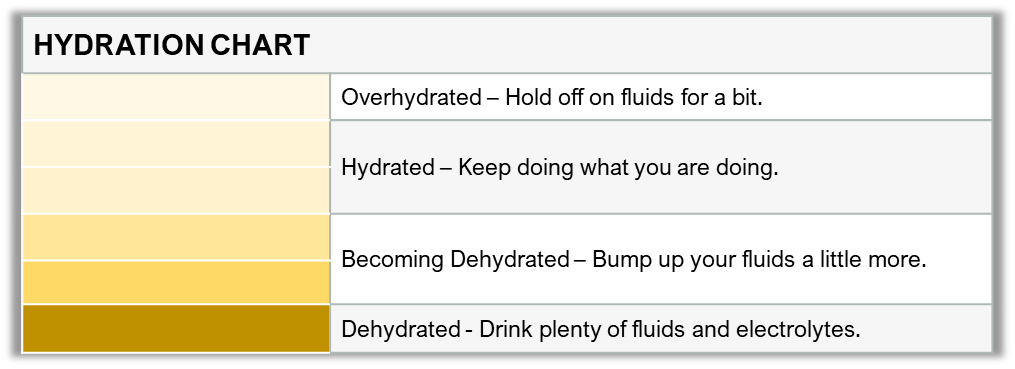
Water should be the main beverage athletes consume to rehydrate. Sports drinks should be reserved for events lasting longer than one hour, hot and humid conditions, or for athletes who have “salty sweat.” For optimal hydration, drink fluids before, during, and after training and competition.
A note on caffeine: many athletes rely on a caffeine boost either to start their morning or as an afternoon pick-me-up. Studies show that about 200mg of coffee an hour before exercise might even help boost performance! But too much caffeine can be dehydrating, interfere with sleep, and can show up in NCAA drug-tests. Limit caffeine intake to 1-2 servings before 3pm to avoid impacting training and performance.
Tips for Dining in Your Café
Consuming a diet with plenty of carbohydrates, lean proteins, fruits and vegetables, and healthy fat will provide the body with the essential nutrients needed for optimal training and performance. Our cafés provide a variety of these foods daily as we are committed to fueling collegiate athletes with food that let them eat, train, and perform well.
- Review daily menus online at cafebonappetit.com or sign up for Menu Mail to receive the daily menu right in your email.
- Deciding how you are going to build your Athlete’s Plate for each meal can help you make choices that will fuel your training.
- Can’t make it to the café? Look for grab and go items that have a mix of carbohydrates and protein to keep you fueled.
- Tired of plain water? Try fruited water available in the café. Seasonal fruits can add flavor burst without sugar, sugar substitutes, or caffeine.